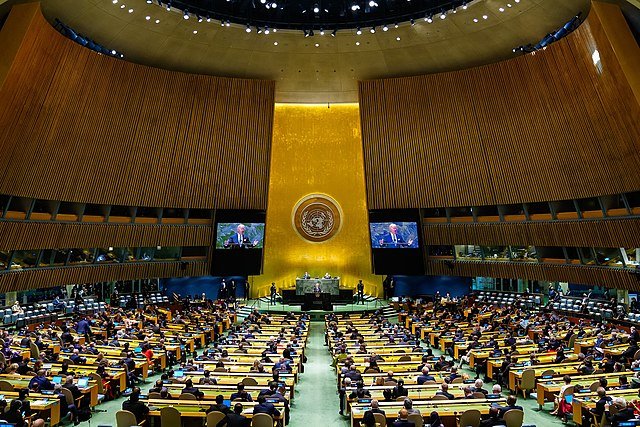Is ‘America Back’? Biden’s UN Address to the General Assembly
President Biden speaks before the UN General Assembly on September 21 (Wikimedia Commons)
After four years of “America First” isolationism under Donald Trump, the Biden administration has sought to reclaim the United States’s commitment to multilateral diplomacy. In his first speech to the UN General Assembly, President Joe Biden affirmed his faith in international alliances and global partnership, alluding to his first address to a global audience, in which he claimed, “America is Back.”
With the former president having consistently touted a smaller UN budget and repudiated international agreements, the Trump administration’s relationship with the international community undermined U.S. credibility as a global beacon of multilateralism and cooperation. Working to walk back the rhetoric and policies of his predecessor, Biden took the opportunity in his UN address to defend U.S. leadership and convince UN member states of its return to its historic responsibility and fidelity to the UN and its work.
Employing a message of “relentless diplomacy,” Biden demonstrated the U.S.’s commitment to cooperation over nationalism, a departure from Trump’s bellicose speeches. Compared to Trump, who used “sovereign” 19 times in his 2017 address to the UN, Biden frequently invoked the words “international,” “cooperation,” and “institutions” throughout his speech, signaling American confidence in global partnership and denouncing nationalism. Biden said, the U.S. “will lead on all of the greatest challenges of our time, from COVID to climate, peace and security, human dignity and human rights, but we will not do it alone.” Time will tell if the U.S. will live up to these promises and if the international community will accept a U.S. demonstration of strength after four years of “America First.”
Biden’s address has coincided with heightened U.S. participation in international institutions’ efforts. Prior to his speech, Estonia’s ambassador to the UN said Biden’s leadership marked that the U.S. “is back…. visible, and… really good for us.” Others have recognized Linda Thomas-Greenfield, Biden’s ambassador to the UN, as a serious advocate for cooperation. Having pushed the Security Council to engage in the Tigray War and the coup in Myanmar, Thomas-Greenfield’s leadership is indicative of the administration’s strengthened commitment to institutions and their central tenets.
Nonetheless, some officials do not see the U.S. embracing a multilateral strategy after Trump’s presidency. Critics have seized upon Biden’s largely unilateral exit from Afghanistan and U.S. authorization of booster shots while developing countries are still struggling to acquire first doses. Calling on the U.S. to purchase more vaccines for the World Health Organization’s COVAX program, which aims to ensure more equitable access to COVID-19 vaccines, some critics claim Biden’s vaccine distribution strategy echoes the nationalist sentiments of Trump’s foreign policy. The White House additionally dropped a Security Council resolution on tackling COVID-19. The Biden administration is clearly in a difficult position in which it must work to reaffirm support for the UN and other international cooperative efforts while maintaining a degree of discernment and avoiding letting public perception, domestic and international, dictate foreign policy to an excessive degree.
While Joe Biden’s address instills confidence in the future of American global leadership, US credibility is still contested. The Biden administration has rightfully abandoned isolationist rhetoric and verbally signaled enthusiasm for global partnership, but whether it can leverage influence will depend on its loyalty to multilateral efforts, not just in name, but also in deed.

